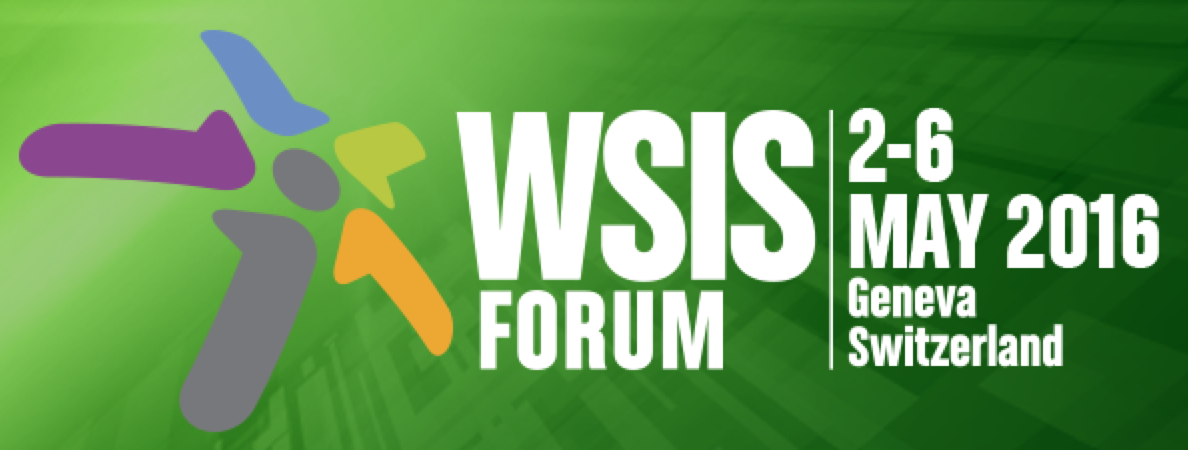The World Summit on the Information Society (WSIS) Forum discussed the role of information and communication technology (ICT) in accelerating development and countering radicalization and intolerance, noting synergies between the policy agendas of WSIS and Sustainable Development Goal (SDG) 16 on peace, justice and institutions.
 6 May 2016: The World Summit on the Information Society (WSIS) Forum discussed the role of information and communication technology (ICT) in accelerating development and countering radicalization and intolerance, noting synergies between the policy agendas of WSIS and Sustainable Development Goal (SDG) 16 on peace, justice and institutions.
6 May 2016: The World Summit on the Information Society (WSIS) Forum discussed the role of information and communication technology (ICT) in accelerating development and countering radicalization and intolerance, noting synergies between the policy agendas of WSIS and Sustainable Development Goal (SDG) 16 on peace, justice and institutions.
The WSIS is the world’s largest gathering of the ICT for Development (ICT4D) community. The UN International Telecommunications Union (ITU) convenes the Forum annually. The 2016 Forum took place in Geneva, Switzerland, from 2-6 May 2016, co-organized by ITU, the UN Educational, Scientific and Cultural Organization (UNESCO), the UN Development Programme (UNDP) and the UN Conference on Trade and Development (UNCTAD), in collaboration with many other UN organizations. The theme of the 2016 Forum was ‘WSIS Action Lines: Supporting the Implementation of SDGs.’ The UNGA agreed, in adopting the 2030 Agenda for Sustainable Development (A/RES/70/1), that the WSIS Forum serves as an important forum for discussing the role of ICTs as a means of implementation of the SDGs and targets.
In a video message to the conference, UN Secretary-General Ban Ki-moon highlighted the power of ICTs to accelerate innovation, saying that such technologies will be critical to advancing the 2030 Agenda, the Paris Agreement on climate change, and achieving the Sustainable Development Goals (SDGs). He urged WSIS participants to continue working to close the digital divide and ensure universal access to a more open information society.
Over 1,800 participants from more than 150 countries attended the 2016 Forum. The discussions included a high-level track on 3 and 4 May, where more than 85 ministers and senior officials, business and civil society leaders took part in a series of 16 moderated dialogues on themes including the role of WSIS as an accelerator and enabler of sustainable development, and the digital economy and trade. Two high-level dialogues took place, one on cybersecurity, and another on promoting peaceful and inclusive knowledge societies.
In relation to SDG 16 (Promote peaceful and inclusive societies for sustainable development, provide access to justice for all and build effective, accountable and inclusive institutions at all levels), participants underscored the importance of Media and Information Literacy (MIL) for building the capacity of youth to think critically and engage with diversity. In countering radicalization and hate speech, participants emphasized the need for “soft” measures in addition to security-oriented approaches. They pointed to the contribution and role of online platforms for supporting youth creativity, peer-to-peer learning, peace building and integrating persons with disabilities into social life. They also called for using platforms, networks and institutions to build trust and develop digital inclusion and address inequalities.
In discussions, UNESCO emphasized the value of a free press and an independent and plural media, as well as the emerging potential of social media and big data for achieving all the SDG targets. Participants highlighted the difficulty of setting indicators for some of the targets for SDG 16, including those on killings of journalists and on public access to information, highlighting safety for whistleblowers.
The Forum produced several outputs, including a Forum outcome document and a summary of the high-level track outcomes, which will be submitted to the Commission on Science and Technology (CSTD), the UN General Assembly (UNGA) and the ITU Council. The meeting outputs also included a document, ‘WSIS Action Lines Support Implementation of the Sustainable Development Goals (SDGs)’ and a document on the WSIS Forum 2016 and SDG Matrix.
The WSIS organizes its work in 11 ‘action lines’ that address: the role of public governance authorities and all stakeholders in promoting ICTs for development; information and communication infrastructure; access to information and knowledge; capacity building, building confidence and security in the use of ICTs, enabling environment; ICT applications, for example, in e-government, e-business and e-learning; cultural diversity and identity, linguistic diversity and local content; media; ethical dimensions of the Information Society; and international and regional cooperation. [ITU Press Release] [WSIS Outcome Documents] [UN Press Release on Secretary-General’s Statement] [UNESCO Press Release] [WSIS Website]